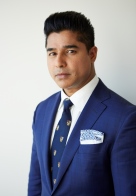Monica Volodarsky, a junior at Central High School, is what philanthropist attorney Ajay Raju calls a “one-percenter.” It’s not that she’s a billionaire tax evader; she’s 17-years-old, a gifted writer, just starting out in the world. But Raju uses the term intentionally. “The term one-percenters is used in a negative way,” he says. “But that’s not what I’m talking about. I mean the one percent in talent, intelligence, leadership—and not just in business, but also arts, music, writing, medicine.”

Monica is one of 14 high schoolers in the first class of Raju’s Germination Project, launched last year to create a squadron of future Philly leaders who are learning from an impressionable age how to combine their energies to make this city great. Next week, GP inducts a new class of 20 sophomores from 13 area high schools at a Union League gala modeled after NFL Draft Day. These students—and the classes that follow—will learn about civic engagement; about leadership from some of the city’s most powerful; about connections, and how to leverage them for both personal and civic good. They are expected, starting now but going long into adulthood, to use those lessons to create the kind of Philadelphia Raju envisions: A place of greatness, where its civic leaders look beyond their own self-interest to make a city that is on the forefront of business, medicine, art and opportunity for all.
“Germination is like X-Men University,” says Raju, CEO and chairman of law firm Dilworth Paxson LLP, and a businessman/venture capitalist. (Raju is also a co-founder and board member of The Citizen.) “These kids will save the world.”
Germination Project is a mentorship program, with a unique twist. GP kids are not the neediest in the city—there’s a Clothier among them, and while several hail from Philly publics or charters, around half attend elite suburban private schools. They are not getting scholarships, even if they need them; they’re not getting funding for their ideas, or the promise of a job after college. That’s not Raju’s mission. Others already do that—and have not, he contends, made a widespread impact on the city.
The fellows are expected to create the kind of Philadelphia Raju envisions: A place of greatness, where its civic leaders look beyond their own self-interest to make a city that is on the forefront of business, medicine, art and opportunity.
Raju is a pragmatist in a dreamer’s cloak. He launched GP after becoming frustrated by the slow pace of change in Philly and by what he sees as the blinders of the powerful class of doers in town. So he set out to create a new class of doers, whose eyes and hearts are open to creating real, lasting change in the city. Over dinner at the Union League, where the self-made millionaire hobnobs with the region’s rich and powerful, Raju points out the obvious: Many of his GP kids are already headed there, with or without his help. With Germination, though, he expects—rather than hopes—that these (to-be) powerful Philadelphians will do what they do with an eye to making the city better for everyone. He describes it, as he is wont to do, with a metaphor: His GP kids are seeds, being planted into the ground of Philadelphia. When they blossom, in 20 or so years, they will bring bounty to the city around them. “The opportunity here is not for the students,” says Raju. “It’s an opportunity for the city.”
The first class in GP’s first year came from 10 area high schools, which selected a few students each who they encouraged to apply to the program. (GP Project Manager Eric Berkowitz says the schools were the ones that responded most enthusiastically when he reached out to them.) The programming since last April’s draft day gala has been a loose combination of high-impact exclusive events, bonding, and actions—nothing, Raju insists, like a “curriculum,” more like a journey pulled from his impressive rolodex.
To prepare for their induction gala, every student was sent to Boyd’s—Raju’s clothier—to be outfitted in an appropriate suit, as well as for a lesson in how to present themselves to the world. In the beginning of summer, the fellows attended a two-week Wharton Leadership Boot Camp, a modified version of a program ordinarily for executives. They spent an evening at the Kimmel Center, getting a behind-the-scenes tour and meeting with Kimmel Center President and CEO Anne Ewers, to understand the importance of the arts in Philadelphia. A trip to the New York Stock Exchange introduced them to the world of high finance.
They also engaged in projects with an immediate impact. Several helped to build a school playground in Olney last fall. And they all (including the new fellows) are participating in a challenge with the American Heart Association to teach CPR to 10,000 low-income Philadelphians. They learned CPR; learned how to teach it; advocated for training in their schools; and some went to Harrisburg to lobby legislators to mandate CPR training as a graduation requirement (an AHA mission). Soon, Berkowitz says, they will start working in neighborhoods with churches and community groups to bring CPR training to residents. The project is typical of GP’s mission: It encourages leadership and action, with a civic-minded impact.
“The Germination Project has given us the strength to see Philadelphia as it could be, and as we are obligated to make it be,” writes Monica Volodarsky. “Suddenly, I am no longer afraid of the challenges that will present themselves as we move forward. Instead, a fervent desire to take action overcomes me.”
For some, Germination Project has already changed their future. Monica Volodarsky, for example, was always drawn to civic engagement—it’s why she applied to GP after hearing about it at a school assembly. But she had planned to study English literature in college and become a writer because she thought “the written word was the primary vehicle of change and awareness.” Then she went to the summer program at Penn, learned about impact investing, and became enthralled by Wharton’s Social Impact Initiative. Now she wants a career in international business, where she thinks she can do the most good. A few hours after she told Berkowitz, he secured her an interview at Wharton, and this summer she’ll do an internship.
“Monica was always going to do something great,” Berkowitz says. “But for her to partner up with Penn will make her commitment to Philadelphia even more robust. We’re helping to create loyalty. Selfishly, 10 years from now, that means we will benefit from her talents.”
This is both the promise and the question mark of Germination Project: How can they guarantee that these teenagers will keep their talents in Philadelphia? So far, Raju says, the Pamela and Ajay Raju Foundation has spent $600,000 to get GP off the ground and running. That’s an investment whose returns he hopes will reap multiple rewards for the city. Raju promises a lifetime membership in GP, with one condition: That the fellows, after college, return to the Philadelphia area to work and live. “Once they’re in, they’re in for life,” Raju says. “But once they’re out, they can never come back.”
Of course, GP will lose some kids over time, maybe even most of them. But it’s those who remain, year after year, who could become an army of well-intentioned civic leaders. “We’re injecting a sense of civic commitment in a cross-section of kids, at an impressionable age,” says Berkowitz. “Fifteen to 20 years from now, nothing may come of this. But maybe something does. We’re facilitating connections that may not happen naturally and that can have a meaningful impact.”
Will it work? It’s decades too soon to know. So far, though, Raju’s vision seems to have taken hold of the 2015 fellows, who are getting ready to help usher in a new group of GP students. Monica, in an article for Central’s newspaper, The Centralizer, encapsulated Raju’s dream, which is now her dream, of a Philadelphia 50 years in the future “brimming with opportunities and talent, a mecca of success.”
“How will I have contributed to this version of Philadelphia?” Monica wrote. “What will I, and my fellows, have to do to make this future a reality? What will the next class do, after and along with us? Suddenly the vision of Germination Project becomes very clear. It was founded to erase the idea that the city remaining after us would be one of poverty, desolation, and crime. The Germination Project has given us the strength to see Philadelphia as it could be, and as we are obligated to make it be. Suddenly, I am no longer afraid of the challenges that will present themselves as we move forward. Instead, a fervent desire to take action overcomes me.”
Photo Header: Germination Project fellows touring the New York Stock Exchange, courtesy of Germination Project.



